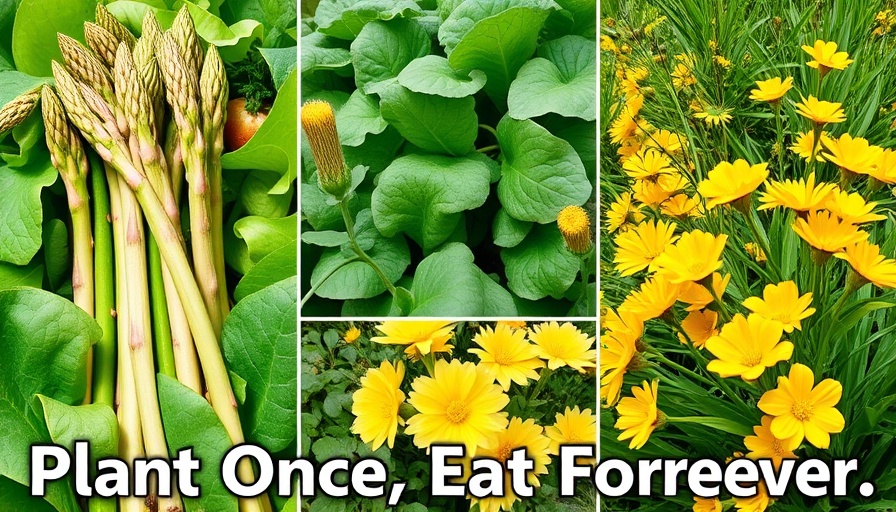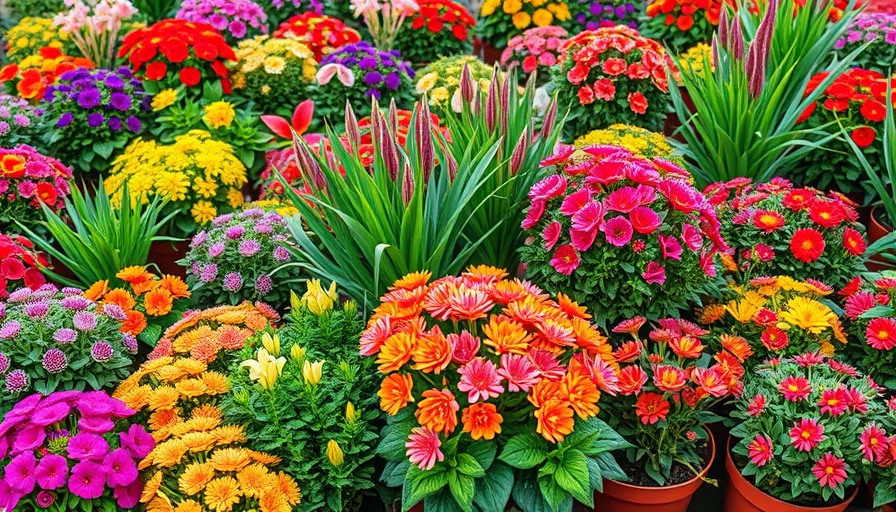
Unlocking the Secrets of Perennial Gardening in Small Spaces
For many home residents in Metro Vancouver with limited gardening space, rethinking how to cultivate a sustainable and bountiful garden can make all the difference. If you're looking to maximize your harvest while minimizing the effort of replanting, considering edible perennials is a game-changer. These charismatic plants don’t just beautify your garden; they offer delicious returns year after year. Let’s explore some of the best perennials that can turn your garden into a springtime feast machine.
In the video 7 Perennials for HUGE Spring Harvests! (No Replanting!), the discussion dives into effective gardening strategies, exploring key insights that sparked deeper analysis on our end.
Asparagus: A Time-Tested Favorite
Asparagus is heralded as the superstar of early spring harvests. Once established, these spears spring to life in March or April, delivering a flavor that’s notably sweeter than store-bought options. Though impatience can strike early gardeners, understanding that the first two years should involve minimal harvesting is crucial; patience pays off with an abundance of spears that can produce for up to 20 years. By placing your asparagus crowns in well-drained soil and ensuring they receive adequate sunlight and mulch, you’ll find yourself enjoying a treasured green early each spring.
Rhubarb: A Stunner with a Purpose
Rhubarb is more than just a pretty plant; its vibrant red stalks add visual appeal and delight your taste buds. As both an ornamental and edible entity, it’s a versatile choice for pies, jams, and sauces. Thriving in cooler climates, it requires minimal care once established, needing just partial sun and compost-rich soil. Dividing the crown every few years will keep it healthy and vigorous, marking it as a must-have for any kitchen garden.
Sorrel: A Unique Flavor Experience
Imagine a leafy green that possesses a lively, lemony flavor. Welcome sorrel, one of the first greens to appear in your garden, often braving the elements by pushing through light snow. Its rich vitamin C content and low-maintenance nature make it an attractive option for busy urban gardeners. Plant sorrel in containers or directly in the garden bed, and eagerly await that refreshing spring taste as young leaves are ready for harvesting in as little as a few months.
Walking Onions: A Garden Curiosity
Walking onions are not only a conversation starter but also a unique addition to your culinary repertoire. They “walk” by dropping their top sets that root into the soil and expand your harvest each year. This charming plant yields edible greens early in spring and bulbs later, making it perfect for adding a range of flavors to your dishes. Gardens bustling with children will see their imaginations soar as they watch this quirky plant thrive!
Good King Henry: A Medieval Delight
This plant showcases how history can grace your modern garden. Good King Henry serves as a spinach alternative; it emerges with lush leaves as soon as temperatures rise. Its earthy flavor works wonderfully in various dishes, and its ability to thrive in partial shade is advantageous for those who may not have full sun exposure. Plus, it flourishes year after year, rewarding you each spring with a hearty yield.
Lovage: The Fragrant Giant
Lovage is a robust plant that brings an aromatic flavor to your kitchen. Reaching heights of up to 6 feet, every part is edible, from its leaves to its seeds. This herb’s strong taste lends itself beautifully to broths and soups, making it a cherished ingredient for home cooks. Keep lovage planted in rich, well-drained soil and yield rich harvests without the hassle of replanting.
Chives: Small but Mighty
Last but certainly not least, chives often steal the limelight in early spring gardens. These small plants bring a mild oniony flavor to dishes and are incredibly versatile for growing in borders, containers, or tucked between rows of vegetables. Their cheerful purple flowers are not only delightful to the eye but also act as a magnet for pollinators, enhancing your garden's ecosystem.
Your Guide to Bountiful Spring Harvests
The options are abundant when it comes to edible perennials that require little effort but deliver massive rewards. As explored in the video 7 Perennials for HUGE Spring Harvests! (No Replanting!), these plants are perfect for a thriving garden that gives back each year. Consider incorporating these perennials into your garden to enjoy the unique flavors and gratifying harvests they provide. They are ideal for those confined to small spaces while holding the potential to enrich the culinary landscape.
Do you have a perennial garden or are you considering starting one? Share your experiences and questions in the comments and start your journey toward a sustainable and delicious garden today!
 Add Row
Add Row  Add
Add 




 Add Row
Add Row  Add
Add 

Write A Comment